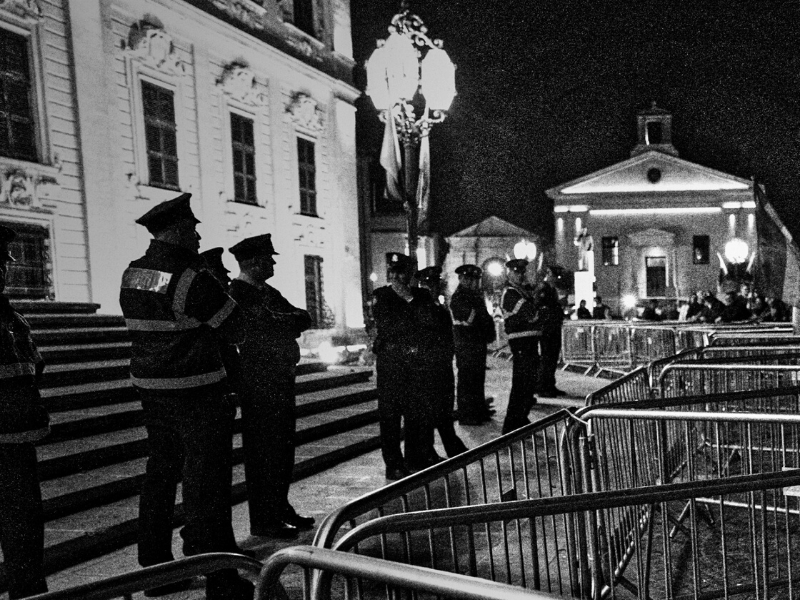In their 2021 ‘Nations in Transit’ report, Freedom House noted how Hungary and Poland stood out for their unparalleled democratic deterioration over the past decade. The two countries have long been emulating each other and evolved from merely attacking democratic principles to openly establishing anti-democratic practices, their mask well and truly off.
Many politicians, in and outside of Europe, are taking their cue from these two countries in an attempt to redefine the boundaries of what is acceptable behaviour, and it is no longer possible to discuss the decline of democracy in European countries without mentioning Viktor Orbán – because his brand of politics can no longer be ignored.
You pick up Orbánesque notes everywhere; from France’s right-wing National Rally, Spain’s Podemos on the left, Italy’s former Prime Minister Matteo Renzi, and former Minister of the Interior Matteo Salvini, former US President Donald Trump and, yes, these notes can be picked up in Malta too.
Kneecapping Malta’s NGOs
Aside from rampant cronyism, polarised media, a biased State broadcaster, and intolerance towards migrants and asylum seekers, one of the more recent developments in Malta that is reminiscent of Orban’s brand of politics is the targeting of Malta’s civil society.
When the NGO Repubblika became too vocal for Malta’s criticism-averse public officials, the Commissioner for Voluntary Organisations, tasked with regulating the country’s NGOs, accused the organisation of working for private interests, over-spending, and acting as a propagandist for a political party.
This did little to silence Repubblika, but in a move with more far-reaching consequences, legal notices were recently published on regulating public fundraising activities and charity shops.
The new rules include provisions on how NGOs are required to sign up every three months to be allowed to collect money and how they communicate with their audiences. When 92 NGOs called on the government to retract the legal notices with immediate effect and consult with all the voluntary organisations to find the best way forward, they were largely ignored.
In June 2017, Hungary’s parliament adopted the law on the Transparency of Organisations Supported from Abroad (referring to foreign-funded organisations), legislation that intergovernmental and civil society organisations widely viewed as a major obstacle to their work and their interactions with civil society domestically and internationally. Government officials said the law simply aimed at ensuring transparency and accountability. The European Courts of Justice disagreed and found the law violated EU regulations.
Hungary’s law on foreign NGOs was intended to target George Soros, the Hungarian-born billionaire who funds liberal causes and who the Hungarian prime minister frequently casts into the role of bogeyman to explain away all of Hungary’s woes.
A conspiracy by foreign agents
In his 2010 election campaign, Orbán fanned the flames of Hungarian discontent by attacking outsiders as oppressors and smeared his opponents as stooges of foreign interests. Not too different from what Parliamentary Secretary Alex Muscat had to say following the revelations of the Passport Papers investigations, insisting there is a hidden hand pushing against the controversial programme and refusing to accept that the findings from the leak were a purely journalistic exercise.
“Who is financing these attacks?” Muscat asked.
The Daphne Caruana Galizia Foundation spelt out rather clearly how the investigation was financed, but it was largely ignored by the parliamentary secretary. At some point, similar questions were bandied about by government propagandists about The Shift, even as it published a breakdown of its finances.
This ‘foreign conspiracy’ narrative is not simply a denial of facts – it’s a deliberate strategy that aims to portray criticism and civil disobedience as an ‘import’. According to autocrats or would-be dictators, dissent is always the work of a foreign agency whose ultimate goal is to destabilise the country and any form of opposition unpatriotic. It sounds familiar, doesn’t it?
Obedience is defined as the norm, and dissent is considered deviant, anti-social behaviour. This definition attempts to create distance between the opposition and the larger population.
It is why government mouthpieces keep labelling Malta’s nationalist MEPs as traitors and why the NGO Repubblika was once described as “extremist” – implying that they share nothing in common with “ordinary” people, even as these same “traitors” and “extremists” fight for the rights of those people who go on to insult them.
Such tactics are intended to discourage democratic action – or any kind of activism for that matter – in the hope that an indifferent and cynical society will allow corrupt individuals with authoritarian tendencies to thrive.
Civil society groups, outspoken or otherwise, remain an important component of a country’s democratic fabric, and if in Hungary civil society found ways of resisting Orbán’s illiberal governance, especially within the digital sphere (that is harder to shut down than traditional media) then so too can Malta’s NGOs.













Labour was, is and will remain a deep rooted time warp, which always finds and exploits the illiterate and semi literate pea brained members of society, deep frozen and in abundant supply, for the sustainability of an Orban styled charity kitchen, producing the staple bowl of ‘il-minestra tan-nanna’, and cleverly marketed with a well packaged tax financed disinformation advertising campaign.